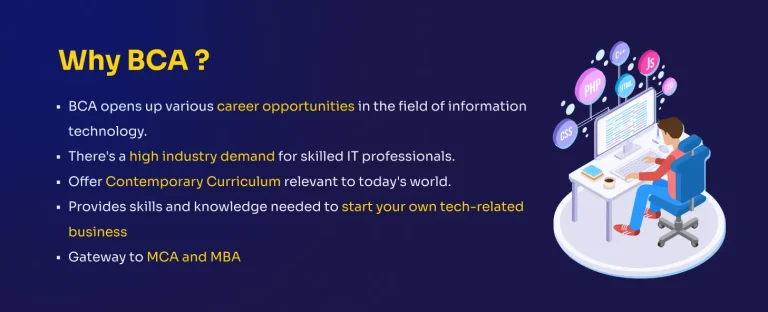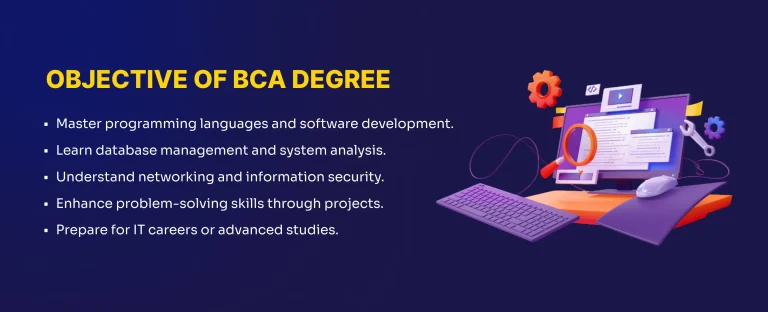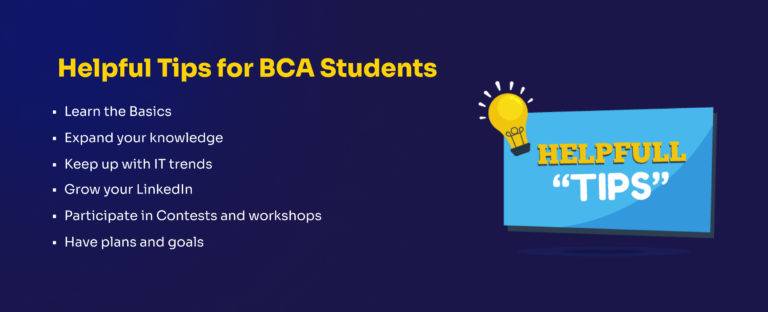Are you intrigued by the world of computers, fascinated by coding, and curious about software development? If so, pursuing a Bachelor of Computer Application (BCA) might be the perfect fit for you. In this comprehensive guide, we’ll delve into all aspects of BCA courses, from what they entail to career prospects and beyond.
The goal of the undergraduate Bachelor of Computer Applications (BCA) program is to give students a solid foundation in computer science and its real-world applications. Programming languages, data structures, software development, database administration, networking, and other relevant topics are frequently covered in the curriculum.
Read: What is the full form of B.C.A, and what does B.C.A stand for?
Importance of BCA Course in the Modern Era
1. Relevance to the Information Technology Industry:
Bachelor of computer applications is still very important in the modern era because of the information technology (IT) industry’s continuous growth. Students who complete the program will be prepared for a variety of careers in web development, database administration, system analysis, and software development.
2. Flexibility in the Face of Technological Changes:
The technology industry is ever-changing and dynamic. The BCA course programs frequently aim to include the most recent advancements in the IT sector.
3. Employability across Sectors:
BCA graduates are not just restricted to the IT sector. With the abilities they get from the program, they are highly valued assets in a variety of fields where computer applications are essential, such as banking, healthcare, education, e-commerce, and more.
4. Entrepreneurial Opportunities:
Graduates of the BCA program may choose to look into starting their businesses. Their expertise in technology management and software development can enable them to engage in creative projects or launch their own IT-related companies.
5. Bridge to Advanced Degrees:
For individuals who want to pursue advanced degrees like the Master of Computer Applications (MCA) or other relevant master’s programs, the bachelor of computer applications is a good starting point. Those who pursue additional education can become specialists in particular fields and assume leadership positions in the IT industry.
Read: All about Bachelors of Computer Application) at Inspiria Knowledge Campus
Role and Responsibilities of the BCA course Graduates
Depending on their exact job title, sector, and company, computer science graduates may have different tasks and responsibilities. Nonetheless, the following are typical positions and duties that BCA graduates may experience:
1. Responsibilities of Software Developer/Engineer
- Design, code, test, and maintain software applications.
- Collaborate with cross-functional teams to develop software solutions.
- Analyze user requirements and design appropriate software solutions.
- Debug and troubleshoot software issues.
- Stay updated on industry trends and incorporate best practices in software development.
Read: How to Become a Software Engineer & Career Opportunities?
2. Responsibilities of System Analysts
- Evaluate and analyze existing systems and processes.
- Gather and document user requirements.
- Propose and design improvements to existing systems.
- Collaborate with stakeholders to ensure system efficiency and effectiveness.
- Bridge the gap between technical and non-technical teams.
3. Responsibilities of Database Administrator
- Design, implement, and maintain databases.
- Ensure data security and integrity.
- Optimize database performance.
- Backup and restore databases as needed.
- Collaborate with development teams to integrate databases into applications.
4. Responsibilities of Network Administrator
- Design, implement, and maintain computer networks.
- Monitor network performance and troubleshoot issues.
- Ensure network security and implement necessary protocols.
- Collaborate with other IT professionals to ensure seamless network operations.
5. Responsibilities of Web Developer
- Design and develop websites and web applications.
- Collaborate with designers to create user-friendly interfaces.
- Ensure web applications are responsive and compatible across devices.
- Implement security measures for web applications.
- Stay updated on web development trends and technologies.
6. Responsibilities of Cybersecurity Analyst
- Implement security measures to protect computer systems and networks.
- Monitor and analyze security alerts and incidents.
- Conduct vulnerability assessments and penetration testing.
- Develop and implement security policies and procedures.
- Stay informed about the latest cybersecurity threats and solutions.
7. Responsibilities of Machine Learning Engineer/Data Scientist
- Develop and implement machine learning algorithms.
- Analyze and interpret complex data sets.
- Build predictive models and algorithms.
- Collaborate with data engineers to gather and preprocess data.
- Stay updated on advancements in machine learning and data science.
8. Responsibilities of IT Project Manager
- Plan and oversee IT projects from initiation to completion.
- Manage project resources, timelines, and budgets.
- Communicate with stakeholders and team members.
- Mitigate project risks and solve issues as they arise.
- Ensure project goals align with organizational objectives.
9. Responsibilities of Technical Support Specialist
- Provide technical assistance to end-users.
- Troubleshoot hardware and software issues.
- Install and configure computer systems and software.
- Document and track support tickets.
- Communicate technical information to non-technical users.
Read: Best BCA Colleges in India

Choosing the Right Computer Science Course
Choosing to pursue a Bachelor’s in Computer Science is a significant decision, and there are several factors to consider to ensure that your choice aligns with your academic and career goals. Here are key factors to keep in mind:
- Program Accreditation: Ensure that the computer science program and the institution are accredited by relevant educational authorities. Accreditation ensures that the program meets certain quality standards.
- Curriculum and Specializations: Review the curriculum to understand the courses offered and any specializations available. Check if the program aligns with your interests and career goals within the broad field of computer science.
- Faculty and Research Opportunities: Investigate the qualifications and research interests of the faculty members. A strong faculty can contribute significantly to the quality of education. Explore if there are research opportunities or projects available for students.
- Facilities and Infrastructure: Assess the quality of laboratories, computer facilities, and other infrastructure. A well-equipped learning environment is crucial for practical hands-on experience.
- Industry Connections and Internship Opportunities: Look for programs that have strong ties with industry partners. Internship opportunities, industry projects, and collaborations can provide valuable real-world experience and enhance your employability.
- Career Services and Placement Support: Check if the institution has a dedicated career services department that assists students in finding internships and job placements. Strong industry connections often translate to better employment opportunities.
- Alumni Success: Research the success stories of alumni from the program. Alumni achievements can give you insights into the potential outcomes and reputation of the program.
- Class Size and Student-to-Faculty Ratio: Consider the class sizes and the student-to-faculty ratio. Smaller class sizes often allow for more personalized attention and interaction with professors.
- Location: Consider the geographical location of the institution. Think about factors such as proximity to tech hubs, cost of living, and potential job opportunities in the area.
- Financial Considerations: Evaluate the cost of tuition, fees, and other expenses. Explore the availability of scholarships, financial aid, or work-study programs to support your education.
- Accommodation and Campus Life: If you plan to live on campus, consider the quality of accommodation and campus facilities. Additionally, assess the campus culture and extracurricular activities available.
- Technology and Tools Used: Inquire about the programming languages, software, and technologies covered in the program. Ensure that the curriculum includes up-to-date and relevant tools used in the industry.
- Flexibility and Elective Courses: Check if the program allows flexibility in choosing elective courses. This flexibility can enable you to tailor your education to your specific interests or career aspirations.
- Global Perspective and Diversity: Consider the international exposure and diversity of the student body. Exposure to a diverse group of peers can enhance your learning experience and cultural understanding.
Types of BCA Courses
Bachelor of Computer Apllications is a diverse field, and various types of courses cover different aspects of the discipline.
Read: Best Professional Computer Courses After 12th
Here are some common BCA course subjects:
1. Core BCA Course:
- Introduction to Computer Science: This fundamental course covers basic concepts like algorithms, data structures, and programming languages.
- Data Structures and Algorithms: In-depth study of data structures and algorithms for solving computational problems efficiently.
- Computer Organization and Architecture: Understanding the architecture and organization of computer systems, including hardware and assembly language.
2. Programming Languages Courses:
- C Programming: Learning the C programming language, often used for system programming.
- C++ Programming: In-depth study of the C++ programming language, focusing on object-oriented programming.
- Java Programming: Introduction to Java and its applications, especially in web development and enterprise-level systems.
- Python Programming: Exploring Python, a versatile language used in web development, data science, and artificial intelligence.
3. Software development course
- Software Engineering: Principles and practices of software development, including project management, testing, and documentation.
- Web Development: Designing and building websites and web applications using technologies like HTML, CSS, JavaScript, and server-side frameworks.
- Mobile App Development: Creating applications for mobile devices using platforms like Android or iOS.
4. Database Management Courses:
- Database Management Systems (DBMS): Understanding the design, implementation, and management of database systems.
- SQL (Structured Query Language): Learning the language used for managing and manipulating relational databases.
5. Networking Courses:
- Computer Networks: Studying the principles of computer networking, including protocols, architecture, and network security.
- Network Programming: Developing applications that communicate over a network.
6: Operating Systems Courses:
- Operating Systems: Understanding the design and functionality of operating systems, including process management, memory management, and file systems.
7: Cybersecurity Courses:
- Cybersecurity Fundamentals: Understanding the principles of cybersecurity, including encryption, network security, and ethical hacking.
- Digital Forensics: Investigating and analyzing computer systems and networks for evidence of cybercrimes.
8. Distributed Systems Courses:
- Distributed Systems: Understanding the design and implementation of systems that distribute computation across multiple computers.
9. Cloud Computing Courses:
- Cloud Computing: Understanding the principles and technologies behind cloud-based services and applications.

Career opportunities in Bachelor of Computer Applications
With technology playing an increasingly important role in many industries, Bachelor of Computer Application provides a wide range of job prospects. BCA graduates can pursue the following popular and sought-after professional paths:
1. Developer/Engineer of Software:
- Provide, create, and manage software programs.
- Utilize programming languages like C++, Python, Java, and others.
- Work together to develop creative software solutions with cross-functional teams.
2. Web developer:
- Develop and construct websites and web apps
- Use frameworks for the back end (Rail on Rails, Django, Node.js) and front end (HTML, CSS, and JavaScript).
- Assure user-friendly and responsive interfaces.
3. Mobile App Developer:
- Create applications for mobile platforms like iOS (Swift) and Android (Java/Kotlin).
- Together with other developers and designers, create captivating mobile applications.
4. Database Administrator:
- Design, develop, and manage databases to guarantee data security and integrity.
- Enhance database efficiency and resolve problems.
- Use database management systems such as Oracle, PostgreSQL, or MySQL.
5. Network engineers and administrators:
- Track network performance and resolve problems.
- Put security measures in place to fend off online attacks.
6. Cybersecurity Analyst:
- Put security measures in place to protect networks and computer systems.
- Keep an eye out for security breaches and look into any that happen.
- Create and put into effect security policies and procedures.
7. Systems Analyst:
- Assess and examine current computer programs and systems.
- Compile user needs and suggest enhancements.
- Close the gap between technical stakeholders and those who are not.
8. IT Project Manager:
- Control project finances, schedules, and resources.
- Coordinate, manage, and carry out IT projects from start to finish.
- Make sure the project’s aims line up with the goals of the organization.
9. UI/UX designer:
- Create user interfaces and experiences for websites and applications.
- Work together with developers to make sure that design elements are integrated smoothly.
10. Cloud Solutions Architect:
- Using AWS, Azure, or Google Cloud, create and implement cloud-based solutions.
- Improve the scalability, cost-effectiveness, and performance of your cloud infrastructure.
11. Engineers in robotics:
- Create and design robotic systems for a range of uses.
- Attempt to integrate the software and physical components.
12. Scholar/Researcher:
- Make scholarly research contributions to the subject of BCA course.
- Mentor students and teach in educational institutions.
Read: Highest Paying Computer Science Jobs | Top 10 Highest Paying Jobs in Computer Science in India
Employment Situation and Sectoral Patterns
- 1. Growing Need for Software Developers: Across a range of businesses, there is still a significant demand for software developers. Employers are searching for qualified individuals with the ability to design, develop, and maintain software systems.
- 2. The emergence of full-stack development: Front-end and back-end engineers with this kind of experience are in high demand. With this all-encompassing approach, developers can work on complete application stacks, which makes them an invaluable resource for businesses.
- 3. Emphasis on Cloud Computing: The cloud is still a popular trend. Because of cloud-based solutions’ scalability, affordability, and flexibility, businesses are gravitating toward them. There is a high demand for cloud developers, engineers, and architects.
- 4. Stress on Cybersecurity: The need for cybersecurity experts is rising in tandem with the frequency and sophistication of cyberattacks. This covers positions like security consultants, ethical hackers, and cybersecurity analysts.
- 5. Extension of Artificial Intelligence (AI) and Machine Learning (ML): These two technologies are revolutionizing several sectors, including banking and healthcare. Data scientists, AI professionals, and machine learning engineers are among the job opportunities in AI and ML.
- 6. Growth in Mobile App Development: Due to the widespread use of mobile devices, there will always be a need for mobile app developers. App developers are needed for both Android and iOS devices to produce applications.
- 7. Integration of DevOps techniques: Software development is starting to adopt DevOps techniques, which emphasize cooperation between development and operations teams. DevOps engineers are essential.
- 8. Big Data Analytics and Data Science: The need for data scientists and analysts has grown as a result of the significance of data-driven decision-making. Experts with the ability to evaluate huge datasets and produce insightful conclusions are highly sought after.
- 9.Blockchain Technology: This technology is becoming more popular than cryptocurrencies. Blockchain technology is being investigated by the financial, supply chain, and healthcare industries. Blockchain experts and developers are in high demand.
- 10. User Experience (UX) Design: The success of websites and applications depends heavily on the user experience. To develop interfaces that are clear and easy to use, UX designers and researchers are in high demand.
- 11. Internet of Things (IoT): Opportunities for individuals with expertise in IoT development and implementation are created by the widespread use of IoT devices in a variety of industries, including manufacturing, smart cities, and healthcare.
- 12. Global Collaboration and Remote Work: The COVID-19 epidemic has sped up the use of remote work. An increasingly global workforce is the result of companies becoming more willing to hire people from other geographic areas.
- 13. Sustainability & Green IT: Eco-friendly and sustainable practices are becoming more and more important to organizations. Green IT specialists strive to minimize technology’s negative environmental effects and enhance energy efficiency.
- 14. Programming Language and Framework Landscape Changing Rapidly: Programming languages and frameworks are always changing. Professionals in the area must remain up to date with the latest tools and technologies.
Skills Needed in BCA Jobs
Professionals in computer science require a blend of technical and non-technical competencies to excel in their roles. The following are necessary skills for those in the computer science field:

1. Programming and Software Development:
- Proficiency in Programming Languages: Strong coding skills in Python, Java, C++, JavaScript, etc.
- Algorithmic Thinking: Ability to design and implement efficient algorithms and data structures.
- Debugging and Troubleshooting: Skills in identifying and resolving software bugs and issues.
2. Problem-Solving Skills:
- Analytical Thinking: Ability to analyze complex problems and break them down into smaller, manageable components.
- Critical Thinking: Evaluate different solutions and make informed decisions based on sound reasoning.
3. Technical Knowledge:
- Understanding of Systems and Architectures: Knowledge of computer systems, architectures, and how various components interact.
- Database Management: Proficiency in working with databases, both relational and NoSQL.
- Networking Concepts: Understanding of networking protocols, security, and distributed systems.
4. Cybersecurity:
- Security Awareness: Awareness of security best practices and the ability to implement security measures.
- Ethical Hacking: Skills in identifying and addressing security vulnerabilities through ethical hacking.
5. Web Development:
- Front-End and Back-End Development: Proficiency in front-end technologies (HTML, CSS, JavaScript) and back-end frameworks (Node.js, Django, Flask).
6. Mobile App Development:
- iOS/Android Development: Skills in developing applications for iOS (Swift) and Android (Java/Kotlin) platforms.
7. Cloud Computing:
- Cloud Platforms: Familiarity with cloud services and platforms like AWS, Azure, or Google Cloud.
- Scalability and Resource Management: Ability to design scalable and resource-efficient cloud solutions.
8. Data Science and Analytics:
- Data Analysis: Skills in using tools like Python, R, or SQL for data analysis.
- Machine Learning: Understanding and application of machine learning algorithms for predictive modelling.
9. User Experience (UX) Design:
- UX Principles: Awareness of user experience principles and design thinking.
- Prototyping: Ability to create prototypes using tools like Sketch, Figma, or Adobe XD.
10. Version Control:
- Git and GitHub: Proficiency in using version control systems for collaborative development.
11. Soft Skills:
- Communication: Strong verbal and written communication skills for effective collaboration and documentation.
- Teamwork: Ability to work well in a team, contribute ideas, and resolve conflicts.
- Adaptability: Readiness to adapt to changing technologies and environments.
12. Project Management:
- Agile and Scrum: Familiarity with agile methodologies and Scrum practices for efficient project management.
- Time Management: Ability to manage time effectively and prioritize tasks.
13. Continuous Learning:
- Curiosity: A natural curiosity and eagerness to learn about new technologies and trends.
- Self-Directed Learning: Ability to independently seek and acquire new knowledge and skills.
14. Ethics and Professionalism:
- Integrity: Adherence to ethical standards and professionalism in handling confidential information.
- Accountability: Taking responsibility for one’s work and decisions.
15. Networking and Collaboration:
- Professional Networking: Building and maintaining professional connections within the industry.
- Collaboration: Ability to collaborate with cross-functional teams and departments.
16. Leadership Skills:
- Initiative: Taking initiative and leading projects or initiatives.
- Decision-Making: Making informed decisions and guiding others when necessary.
Soft skills and communications for Bachelor of Computer Application
Soft skills and effective communication are crucial for success in the BCA careers, as they complement technical proficiency and enhance collaboration. Here are key soft skills and communication aspects that are valuable for BCA careers:
1. Communication Skills:
- Clear Articulation: Expressing ideas and technical concepts clearly and concisely.
- Documentation: Writing clear and comprehensive documentation for code, projects, and processes.
- Active Listening: Paying close attention to others’ ideas and perspectives during discussions.
2. Teamwork and Collaboration:
- Collaborative Problem-Solving: Working effectively with team members to address complex challenges.
- Conflict Resolution: Resolving conflicts professionally and finding compromises when necessary.
- Open Communication: Encouraging an open flow of ideas and feedback within the team.
3. Presentation Skills:
- Technical Presentations: Delivering engaging and informative presentations on technical topics.
- Visual Communication: Effectively using visuals to communicate complex ideas, such as diagrams or charts.
4. Adaptability:
- Flexibility: Adapting to changing project requirements, technologies, or team dynamics.
- Learning Agility: Quickly acquiring new skills and knowledge as needed in a rapidly evolving field.
5. Time Management:
- Prioritization: Effectively prioritizing tasks based on importance and deadlines.
- Meeting Deadlines: Consistently delivering work on time and meeting project deadlines.
6. Problem-Solving Mindset:
- Analytical Thinking: Approaching problems methodically and analytically.
- Creativity: Thinking outside the box to find innovative solutions.
7. Empathy and User-Centric Thinking:
- User Experience (UX) Awareness: Understanding the end-users and incorporating user-centric design principles.
- Empathy: Considering the perspectives and needs of both users and team members.
8. Leadership Skills:
- Initiative: Taking the initiative to lead projects, mentor others, or propose improvements.
- Decision-Making: Making informed decisions and taking responsibility for outcomes.
9. Networking:
- Professional Networking: Building and maintaining professional relationships within the industry.
- Industry Engagement: Participating in conferences, meetups, and online forums to stay connected with industry trends.
10. Interdisciplinary Communication:
- Communication Across Disciplines: Effectively communicating with professionals from non-technical backgrounds.
- Translating Technical Jargon: Presenting technical information in a way that is understandable to non-technical stakeholders.
11. Customer Service Orientation:
- Client Interaction: If applicable, providing excellent customer service and addressing client needs.
- End-User Support: Offering support and assistance to end-users in a helpful manner.
Advantages of BCA Degree
- Long-term success for computer science graduates depends on developing new abilities and being current in the field. The study of computer science is an ever-evolving field as technology advances quickly. The following are crucial areas for industrial relevance and talent development.
- Constantly Learn New Languages and maintain your proficiency in commonly used languages (such as Python, Java, and JavaScript) and be willing to pick up new ones when required for particular tasks or market trends.
- Understanding and utilizing version control systems for collaborative coding is essential for software development and engineering. For effective project management, familiarize yourself with Scrum principles and agile development approaches.
- Learn how to create contemporary, responsive user interfaces using front-end frameworks like React, Angular, or Vue.js. Study programming languages for the server side, such as Node. js, Database management systems (Flask, Django).
- Gain expertise in both Android (Kotlin/Java) and iOS (Swift) app development to reach a wider audience.
- For scalable and effective application deployment, develop your knowledge of cloud platforms such as AWS, Azure, or Google Cloud. Recognize the effects of serverless architecture on the creation of applications.
- To safeguard apps and data, stay current on security protocols and best practices.
- Gain expertise in penetration testing and ethical hacking to find and fix security flaws.
- For efficient data analysis, learn how to use tools like R, Python (NumPy, Pandas), and data visualization frameworks. For predictive modeling, become familiar with machine learning frameworks and techniques (such as TensorFlow and PyTorch).
- Depending on the needs of the project, become proficient with both relational databases (such as MySQL, and PostgreSQL) and NoSQL databases (such as MongoDB).
- Recognize networking topologies and protocols, particularly as they relate to distributed systems. Learn about SDN and how it affects contemporary network administration.
- Automate software delivery and deployment by putting in place pipelines for continuous integration and deployment. Code as Infrastructure. To manage infrastructure, become familiar with Infrastructure as Code (IaC) tools such as Terraform or Ansible.
- Investigate neural networks and deep learning strategies for sophisticated AI applications.
- To effectively collaborate with stakeholders and team members, hone your communication abilities.
Develop your problem-solving abilities to take on challenging tasks in software development. - To stay up to date on the newest developments and trends, read trade journals, and blogs, and attend conferences regularly. Take online classes and get certificates to expand your knowledge and learn new abilities.
Top Companies for BCA Graduates in India
- Tata Consultancy Services (TCS): TCS is one of the largest IT services and consulting companies globally, providing a wide range of services, including software development, consulting, and business process outsourcing.
- Infosys: Infosys is one of the most reputed name when it comes to IT industries. The multinational corporation offers IT consulting and services, including software development, maintenance, and system integration.
- Wipro: Wipro is a leading IT services company providing solutions in areas like digital transformation, business process outsourcing, and software development.
- HCL Technologies: HCL Technologies is a multinational IT services and consulting company known for its expertise in software development, infrastructure management, and engineering services.
- Tech Mahindra: Tech Mahindra is a prominent IT services and consulting company with a focus on digital transformation, network services, and enterprise solutions.
- Cognizant Technology Solutions: Cognizant is a multinational corporation providing IT services, including software development, consulting, and business process outsourcing.
- Larsen & Toubro Infotech (LTI): LTI is a global IT services and solutions company offering services in areas such as software development, infrastructure management, and cybersecurity.
- Mindtree: Mindtree is an international IT consulting and services company specializing in digital transformation, application development, and infrastructure management.
- Mphasis: Mphasis is an IT services company offering solutions in areas like application development, infrastructure services, and business process outsourcing.
- Oracle Financial Services Software: A subsidiary of Oracle Corporation, this company focuses on providing software solutions for the financial services industry.
- Capgemini: Capgemini is a multinational corporation providing consulting, technology, professional, and outsourcing services.
- NIIT Technologies: NIIT Technologies offers IT services, including application development, infrastructure management, and business process outsourcing.
- L&T Technology Services: A subsidiary of Larsen & Toubro, L&T Technology Services offers engineering and IT services to various industries.
- Hexaware Technologies: Hexaware Technologies provides IT services, including application development, testing, and infrastructure management.
Top Companies for BCA Graduates in the world
- Microsoft Corporation: Microsoft is a technology giant known for its software products, including the Windows operating system, Microsoft Office suite, and cloud services like Azure.
- Apple Inc.: While widely known for its hardware products, Apple is a significant player in the software space with its operating systems (iOS, macOS), applications, and services.
- SAP SE: SAP is a German software company that provides enterprise software solutions, including ERP (Enterprise Resource Planning) systems.
- IBM (International Business Machines Corporation): IBM is a global technology and consulting company offering a range of software and hardware products, cloud services, and AI solutions.
- Salesforce: Salesforce is a cloud-based software company primarily known for its customer relationship management (CRM) solutions.
- Adobe Inc.: Adobe is a leading software company specializing in creative software products such as Photoshop, Illustrator, and Acrobat, as well as marketing and analytics solutions
- Intel Corporation: Intel is a major player in the semiconductor industry, and its software division develops tools, compilers, and software libraries.
- SAS Institute Inc.: SAS is a software company known for its analytics and business intelligence solutions used across various industries.
- VMware, Inc.: VMware is a global leader in virtualization and cloud infrastructure software, providing solutions for data center and cloud environments.
- Autodesk, Inc.: Autodesk is a software company specializing in 3D design, engineering, and entertainment software used in various industries.
- Red Hat, Inc. (a subsidiary of IBM): Red Hat is a leading provider of open-source software solutions, particularly in the enterprise Linux and cloud space.
- ServiceNow, Inc.: ServiceNow offers cloud-based services and software for IT service management (ITSM) and workflow automation.
- Atlassian Corporation Plc: Atlassian is known for its collaboration and productivity software, including Jira, Confluence, and Bitbucket.
- Oracle Corporation: Oracle is a multinational company specializing in database management systems, cloud services, and enterprise software solutions.
Additional Tips for students pursuing BCA course
Here are some tips for students obtaining a BCA to assist them succeed academically and get ready for a lucrative job in computer applications:
1. Learn the Principles:
Establish a solid foundation in data structures, algorithms, and programming languages. These foundational concepts will act as the cornerstones for increasingly complex subjects in your education.
2. Expand Your Range of Skills:
Investigate a range of computer science fields, including database administration, networking, mobile app development, and web development. Possessing a varied skill set increases your adaptability and expands your job options.
3. Take Part in Applicable Learning:
Use your theoretical knowledge in practical projects, internships, or one-on-one coding activities. In the IT sector, real-world experience is extremely valuable and supports classroom learning.
4. Keep abreast of Industry Trends:
Keep up with the newest trends and cutting-edge technologies in the IT business by reading trade publications, blogs, and discussion boards. In an ever-changing sector, lifelong learning is essential.
5. Establish a Robust Internet Presence:
Make a polished web portfolio that highlights your work, accomplishments, and abilities. Sites like LinkedIn and GitHub are great for networking and showcasing your skills to possible employers.
6. Take Part in Coding Contests:
Participate in coding contests and challenges to improve your problem-solving abilities. You can practice and demonstrate your coding skills on websites like LeetCode, Codeforces, and HackerRank.
7. Make a Career Path Plan:
Establish both immediate and long-term professional objectives by researching various career options in the field of computer applications. This will assist you in making well-informed choices on your career and academic path.
Discover 5 Brilliant Quora Answers on Deciding to Become a Computer Application Professional https://inspiria.edu.in/quora-computer-application/
Frequently Asked Questions
A: Yes, students from any stream can pursue BCA course after their 12th education.
A: Career scope after Bachelor of Computer Applications is one of the most sought after degree in the technology fields as it prepared to work in software development, Android development, web development, etc. with a BCA degree. Salary after BCA is also very lucrative in 2024.
A: Candidates require a minimum 50% marks in 10+2 in any relevant stream with English as a mandatory subject.










